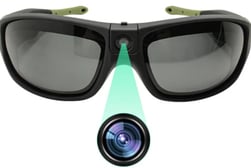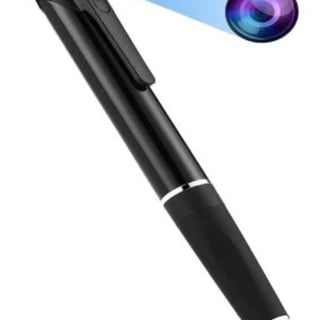All You Need to Know About Spy Cameras
In a world where security and privacy are major concerns, spy cameras have become increasingly popular for both personal and professional use. Whether it’s for monitoring a property, ensuring child safety, or conducting corporate investigations, hidden cameras offer discreet surveillance options. However, with their use comes significant responsibility - especially concerning legal implications. This article will walk you through the different types of spy cameras, why people might choose to use them, and the important legal considerations to be aware of in the United Kingdom.
What is a Spy Camera?
A spy camera, often referred to as a hidden camera or covert camera, is a device designed to capture video (and sometimes audio) discreetly. Unlike standard CCTV systems, spy cameras are designed to blend into their surroundings, making them almost impossible to detect without a thorough search.
These devices vary greatly in size, capability, and form - ranging from tiny pinhole cameras to those hidden in everyday objects like clocks, smoke detectors, and even clothing.
Different Types of Spy Cameras
Spy cameras come in many forms to suit different environments and needs. Here are the main types:
Wired Spy Cameras
Wired cameras are physically connected to a recording device. They generally offer higher quality video and reliability but are less flexible in terms of placement due to the need for cabling.
Common Uses: Office monitoring, long-term home security installations.
Wireless Spy Cameras
These cameras transmit footage wirelessly to a receiver or cloud storage. They are easier to install and can be more discreet as they don’t require visible cables.
Common Uses: Temporary surveillance, rental properties, or event monitoring.
Body-Worn Cameras
Disguised in items like glasses, pens, or clothing, body-worn cameras are designed for
personal surveillance.
Common Uses: Private investigations, personal security, gathering evidence in disputes.
Motion-Activated Spy Cameras
These cameras only begin recording when they detect movement, conserving storage and battery life.
Common Uses: Monitoring specific areas without recording hours of inactivity.
Night Vision Spy Cameras
Equipped with infrared technology, these devices can record video even in complete darkness.
Common Uses: Outdoor surveillance, nighttime home security.
Self-Recording Cameras (SD Card Cameras)
These store footage directly onto a memory card rather than transmitting it elsewhere.
Common Uses: Situations where access to Wi-Fi or external recording devices isn't feasible.
IP Spy Cameras
Internet Protocol (IP) cameras send footage directly over the internet, allowing real-time remote viewing.
Common Uses: Business surveillance, remote home monitoring.
Why People May Use Spy Cameras
There are many legitimate reasons why someone might choose to use a spy camera:
Home Security: To monitor for break-ins, vandalism, or package theft.
Child Safety: Nanny cams can help parents ensure caregivers are treating their children appropriately.
Elderly Care: Families may use cameras to make sure elderly relatives are being properly cared for.
Workplace Security: Employers might monitor stockrooms, offices, or cash registers to prevent theft or misconduct.
Personal Protection: Individuals facing harassment or threats may use body-worn cameras to gather evidence.
Pet Monitoring: Spy cameras can help pet owners check on their animals when they’re away from home.
Investigations: Private investigators often use covert cameras to gather evidence for legal cases.
While the benefits are clear, it's crucial to balance surveillance needs with ethical and legal obligations.
Legal Implications of Using Spy Cameras in the United Kingdom
Using spy cameras in the UK is not illegal per se, but how you use them can easily cross legal boundaries. Here’s a breakdown of the main legal considerations:
Data Protection and GDPR Compliance
If a spy camera records footage that includes identifiable individuals (such as faces, vehicle number plates, or voices), the Data Protection Act 2018 and the UK General Data Protection Regulation (UK GDPR) may apply.
Domestic Use: If cameras are used solely inside your home and do not capture footage of public spaces (e.g., streets, neighbours' gardens), GDPR does not apply.
Commercial Use: Businesses must inform individuals they are being recorded (e.g., via clear signage) and have a lawful basis for surveillance. Covert monitoring should only happen in exceptional circumstances, like when informing staff would undermine the investigation (e.g., suspicion of theft).
Expectation of Privacy
It is illegal to record individuals in areas where they reasonably expect privacy, such as:
Bathrooms
Bedrooms (if rented accommodation or hotel rooms)
Changing rooms
Covert surveillance in these spaces could result in criminal prosecution for privacy violations.
Audio Recording
Recording audio raises additional privacy concerns and is generally more heavily regulated than video alone. In many situations, capturing conversations without consent can breach:
The Investigatory Powers Act 2016
The Regulation of Investigatory Powers Act 2000 (RIPA)
Employment Law
Employers must follow strict rules before using hidden cameras at work:
Covert surveillance is only permitted if it is absolutely necessary for detecting criminal activity or serious misconduct.
Surveillance must be proportionate, necessary, and justifiable.
Failure to comply could lead to claims of constructive dismissal, data protection breaches, or other legal challenges.
Criminal Activity
Installing a spy camera for malicious purposes - such as stalking, harassment, or voyeurism - is a criminal offence and can lead to prosecution under the Protection from Harassment Act 1997 and the Sexual Offences Act 2003.
Disclosure of Recorded Footage
If footage is intended to be used as evidence (for example, in court proceedings), it must have been collected legally. Unlawful recordings may be inadmissible and could even backfire legally on the party who made them.
Final Thoughts: Responsible Use is Key
Spy cameras can be invaluable tools for improving security, ensuring safety, and gathering critical evidence. However, they must be used responsibly and lawfully to avoid violating the rights of others or facing serious legal consequences.
If you are considering installing a spy camera, especially outside your home or in a professional context, it is advisable to:
Conduct a privacy impact assessment.
Inform those being recorded when required.
Ensure recordings are securely stored.
Seek professional legal advice if in doubt.
The right use of surveillance technology is about protection, not intrusion. Always remember: just because you can install a spy camera doesn’t always mean you should.




Contact Us for a free no obligation discussion about your counter-surveillance needs
© 2025 OmniDetect. All rights reserved.
